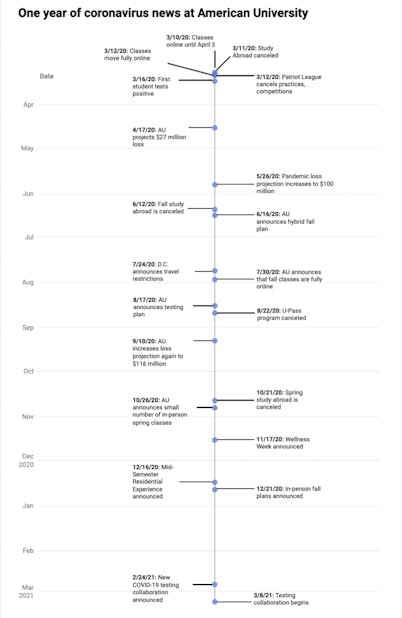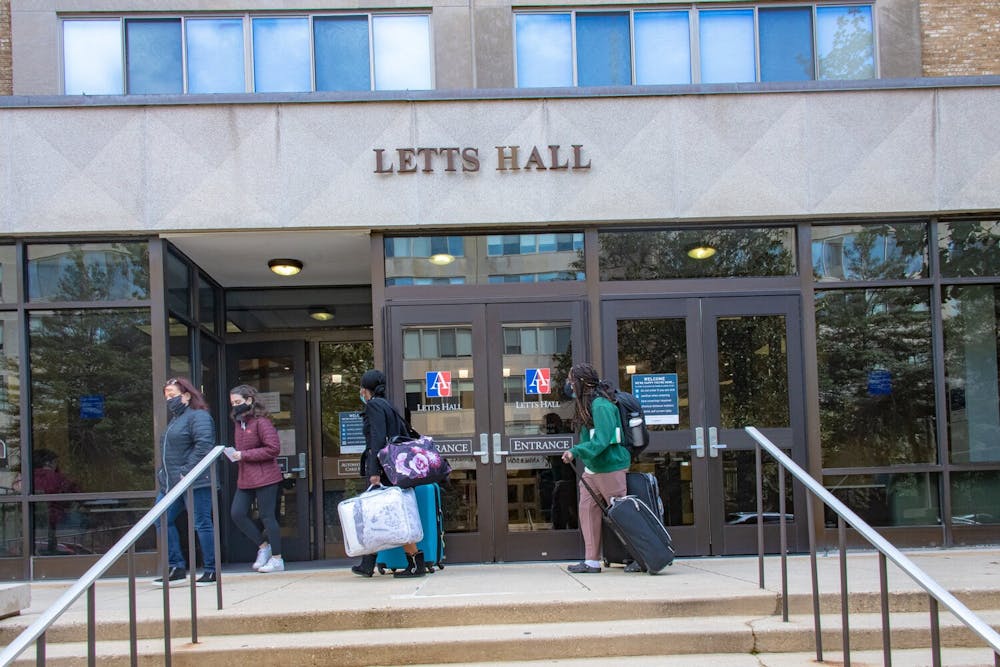Editor’s note: This article originally appeared on theeaglecoronavirusproject.com, a separate website created by Eagle staff at the onset of the coronavirus pandemic in spring 2020. Articles from that website have been migrated to The Eagle’s main site and backdated with the dates they were originally published in order to allow readers to access them more easily.
Dr. David Reitman, the medical director of American University’s Student Health Center, remembers spring break 2020 as a time filled with endless questions and constantly changing answers.
“How do we handle the first case at AU?”
“What does isolation housing entail?”
“How do we protect student staff?”
“Who do we contact in Housing? At the Department of Health?”
“How do we test?”
“What PPE do we need?”
“How does this virus spread?”
He wasn’t scared, he said, as the coronavirus pandemic worsened drastically in just a matter of days, forcing AU to first delay in-person classes for three weeks and then cancel them fully for the semester on March 12, 2020.
Instead, as reality set in, he was simply sad. Campus wouldn’t return to normal for months, if not longer, depriving him and his staff of the reason one goes into college medicine in the first place: the students. For the next few weeks and to a lesser extent for the months after, Reitman would struggle with burnout and exhaustion from working 10 to 14 hour days while handling a situation unlike any he’d encountered in his 15 years in college health.
Three weeks after spring break, the biggest question changed, Reitman said. It became, “How are we going to do next fall?”
Everything the University did, he said, was in service of the planned reopening. Things didn’t go to plan that summer, either.
“Before the announcement was made, we found out. We’d all been working towards this, and it wasn’t going to happen,” Reitman said. “We were disappointed, we were deflated — and that was the point where maximal burnout happened. We all had this feeling of ‘I just want to feel like my life is a little bit normal again, and having students here would make me feel normal,’ and it was just such a disappointment. As much as students were devastated by the decision by the University, it affected the staff … almost as equally.”
Reitman doesn’t regret the cancellation of the fall reopening. In retrospect, it was the right decision, and the lessons learned have put AU squarely on track for a partial return to normal in fall 2021.
One year later

AU students will remember spring break 2020 for its nonstop news, life-changing repercussions and as a period where their college lives deviated from the norm in near-existential ways.
On March 12, 2020, AU President Sylvia Burwell announced in an email to the community that classes would not return to in-person instruction in April after a planned three week online hiatus, as was originally planned. Instead, the semester would be completed virtually.
That wasn’t all. Students who lived on campus were asked to vacate with a hard deadline of March 23, with many at home or on vacation for spring break. Some students couldn’t even get back to campus to retrieve their belongings, and had to ask friends to pack up their rooms instead.
“There are almost constant developments, and we are making decisions based on the best available information,” Burwell wrote at the time. “I know you have received a great deal of information, and it is a time of uncertainty. It is easy to start feeling overwhelmed, but I hope that through continued communication, we can do our part to help reduce anxiety and provide support as we move forward.”
Students and the AU community are continuing to grapple with the loss of a significant portion of their college career and the mental health effects of living and working through a pandemic. Some are trying to recover from a coronavirus infection.
The community has lost everything from housing to jobs, transportation services to in-person commencement. It’s hard to quantify exactly how much has changed. Across the U.S., more than 29 million people have been infected. Almost 530,000 have died, according to the Centers for Disease Control and Prevention.
Over the past year, the AU community has been deeply affected and in many ways changed forever. The University has reported a total of 172 cases among students, faculty, staff and contractors since March 2020. At least one has died: Joseph Kaplan, a professor in the School of Public Affairs and the Washington College of Law, who was 66.
The AU Abroad program, one of the University’s greatest points of pride, has been shut down since March 11, 2020. AU’s athletics programs have struggled to hold games because of positive tests within multiple teams.
According to University announcements and The Eagle, AU is projected to lose approximately $116 million dollars from the pandemic as of Oct. 30, 2020. That’s up from initial projections of $27 million in April.
Over the past two semesters, AU’s situation has changed slightly, allowing a small number of students to return to campus this past fall for emergency housing and for a mid-semester residential program from now until May. The University also canceled spring break, replacing it with a “Wellness Week” in an attempt to cut down on student travel risk.
Vice President of Campus Life and Inclusive Excellence Fanta Aw remembers the early weeks of the pandemic, and really the entire year, as a series of unending and existential decisions that needed to be made.
“I’ve probably had to make more decisions in one year than I’ve had to make in many years put together,” Aw said. “We’ve tried to be guided by prioritizing health and safety first, and really recognizing that we’re a learning organization, and we’re about education.”
Aw said that as the pandemic progressed, she went through the stages of grief in learning to deal with it. She yearned for the community and connection of campus, a facet of AU she said is integral to her work, but had to make do with Zoom calls and limited walks around the grounds. She even went through a period of denial, where she’d wake every morning fully planning to head to her office.
Aw also spent much of her free time learning everything she could about public health, she said, in an attempt to make better-informed decisions for the community.
After a year of exhaustion and hard decisions, though, there’s an end in sight.
“There’s tremendous hope — hope in our community, hope as things improve,” Aw said. “I’ve seen the resilience in our community, particularly in our students, faculty and staff. Folks have tried to be as creative as they can.”
Abroad in a pandemic
Sara Dumont, the executive director of AU Abroad, has attempted to block out many of her memories of the week everything changed. At the time, Dumont, who normally manages high-level aspects of the abroad office, was on a rare trip to join AU’s Nairobi, Kenya program on the ground.
Ten days into her trip, she got the call: All abroad programs were canceled, and students were to return to the U.S. as fast as possible. It fell to Dumont to inform the group.
At the time, she thought the orders were an overreaction. Things in Kenya seemed normal, and life was continuing uninterrupted. Despite her personal qualms, she pulled everyone together, including some students she’d had dinner with the night before. That night, she had said everything would be fine.
“There I was, standing up in front of them, telling them that everyone was going to have to get a flight as soon as possible and leave,” Dumont said. “Everyone was crying. Me too. It was horrible. These lovely, lovely students, who I’d seen were all so excited to be where they were and were having such an amazing time, and to have to own that, that all of their hopes and dreams were going ‘poof’ — it was awful. I was a wreck.”
“This was one of the worst things we’ve ever had to do,” Dumont said.
The next days were full of anxiety, stress and adrenaline. Upon her return to the U.S., Dumont worked with the rest of the Abroad office to ensure students around the world could return to the U.S.
Despite some of what she termed “hairy situations,” including a stressful couple days for students in Morocco, Dumont and her team got every student back before anyone could be stranded by canceled flights and restricted airspace.
It wasn’t just complicated and exhausting, Dumont said. The implication of what they were doing was antithetical to AU Abroad’s mission. While necessary, it wasn’t fulfilling.
“We realized that all of us were working to do things which were the exact opposite of what we want to do and what we believe in, which is helping students get abroad and having, you know, international education and intercultural understanding,” Dumont said. “All we were doing was bringing U.S. citizens back to the U.S. and not letting them go anywhere.”
Still, Dumont is proud of her team’s accomplishments, which include guaranteeing abroad students the ability to finish their classes remotely, if they desire. In addition, AU Abroad has developed a variety of online classes taught through its various centers, so students can still learn from professors beyond AU.
Looking ahead
As vaccine distribution ramps up across the U.S., Reitman and Aw said they hope the fall semester will bring a sense of normalcy back to campus. While students will likely have to wear masks and continue to social distance, residential components, classes and activities are expected to return to much of their pre-pandemic levels.
Dumont said she hopes to have a variety of abroad programs fully up and running for the fall, as well, although certain locations will be delayed due to additional concerns surrounding health and safety protocols.
In a year, Reitman hopes to not be wearing masks or needing to administer tests twice a week. He’s got other things to look forward to, as well: the return of non-COVID-19 health issues at the Student Health Center.
He can’t wait.
While he clarified he’s not a social scientist, the fear surrounding coronavirus infections will last a while, he believes. Eventually, though, that fear will dissipate as people return to work and school.
“I don’t want to sound like I’m drinking the Kool-Aid,” Reitman said. “But, when I look back at this year, one of the things I’ll think of is, ‘Thank God I work for AU.’”
Abbie Veitch contributed reporting to this article.





